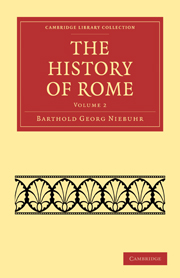Book contents
- Frontmatter
- PREFACE
- Contents
- INTRODUCTION
- The Latin State
- The League with the Latins
- Of the Colonies
- On the Rights of Isopolity and Municipium
- On the Franchise of the Latins
- The League with the Hernicans
- The Wars with the Volscians and Æquians, down to the end of the Veientine War
- The Office of Warden of the City
- The Internal Feuds of the Patricians
- Of the Public Land and its Occupation
- The Assignments of Land before the time of Sp. Cassius
- The Agrarian Law of Sp. Cassius, and his Death
- The seven Consulships of the Fabii
- The Veientine War
- Internal History from the Destruction of the Fabii to the first Pestilence
- The Legend of Coriolanus
- The Wars with the Volscians and Æquians down to the Peace of 295
- The Æquian War down to the Decemvirate
- Disasters and extraordinary Phenomena
- Civil History of the eleven Years preceding the Decemvirate
- The first Decemvirs, and their Laws
- The second Decemvirate
- The first Year after the Restoration of Freedom
- Civil Commotions down to the Constitution of 311
- The Consular Military Tribunate
- The Censorship
- Civil Affairs from the Year 311 down to the last Veientine War
- On the Pay of the Troops
- The Wars down to the Last with Veii
- The last War with Veii
- The other Wars down to that with the Gauls
- Internal History down to the War with the Gauls
- Physical History from 305 to 365
- On the Gauls, and their Immigration into Italy
- The War with the Gauls, and the Taking of Rome
- On the Olympiad and Year of the Taking of Rome
- Rome after the Departure of the Gauls
- The Wars down to the Reform of 384
- Civil History down to the Year 374
- Appendix I On the Roman Mode of Partitioning Landed Property, and on the Limitatio
- Appendix II On the Agrimensores
The Latin State
Published online by Cambridge University Press: 01 June 2011
- Frontmatter
- PREFACE
- Contents
- INTRODUCTION
- The Latin State
- The League with the Latins
- Of the Colonies
- On the Rights of Isopolity and Municipium
- On the Franchise of the Latins
- The League with the Hernicans
- The Wars with the Volscians and Æquians, down to the end of the Veientine War
- The Office of Warden of the City
- The Internal Feuds of the Patricians
- Of the Public Land and its Occupation
- The Assignments of Land before the time of Sp. Cassius
- The Agrarian Law of Sp. Cassius, and his Death
- The seven Consulships of the Fabii
- The Veientine War
- Internal History from the Destruction of the Fabii to the first Pestilence
- The Legend of Coriolanus
- The Wars with the Volscians and Æquians down to the Peace of 295
- The Æquian War down to the Decemvirate
- Disasters and extraordinary Phenomena
- Civil History of the eleven Years preceding the Decemvirate
- The first Decemvirs, and their Laws
- The second Decemvirate
- The first Year after the Restoration of Freedom
- Civil Commotions down to the Constitution of 311
- The Consular Military Tribunate
- The Censorship
- Civil Affairs from the Year 311 down to the last Veientine War
- On the Pay of the Troops
- The Wars down to the Last with Veii
- The last War with Veii
- The other Wars down to that with the Gauls
- Internal History down to the War with the Gauls
- Physical History from 305 to 365
- On the Gauls, and their Immigration into Italy
- The War with the Gauls, and the Taking of Rome
- On the Olympiad and Year of the Taking of Rome
- Rome after the Departure of the Gauls
- The Wars down to the Reform of 384
- Civil History down to the Year 374
- Appendix I On the Roman Mode of Partitioning Landed Property, and on the Limitatio
- Appendix II On the Agrimensores
Summary
In the same year in which the orders adjusted their quarrel, the Romans ratified a perpetual league with the Latins. Peace had already been restored three years before, and had brought back a definite federal relation between the two states: but the league of Sp. Cassius did not merely confirm and explain this; it was a new treaty, substituting an acknowledgement of complete equality for the subjection introduced by Tarquinius, or else for the easy dependence to which Latium had submitted under Servius. We are not told which of these was the relation renewed at the peace; but the latter supposition is the more probable: though it is certainly possible that the Latins, through a timidity which the scantiness of our information does not permit us to explain, and because they were not so far heated by passion as to prefer an alliance with the Volscians, may have returned to their former vassalage; and yet two or three years after have been able to extort a recognition of their absolute equality, and even cessions of land and subjects, from the distress of the government, as the price of their goodwill against the insurgents. Dionysius is aware that these sacrifices were connected with the agreement between the senate and the Latins to oppose the rebels: he considers them as a reward bestowed on the Latins for their good spirit; which is the view Roman pride would take of them, and is assuredly the sole reason why the date of the league was placed after the peace of the Sacred Mount.
- Type
- Chapter
- Information
- The History of Rome , pp. 16 - 36Publisher: Cambridge University PressPrint publication year: 2010First published in: 1832



